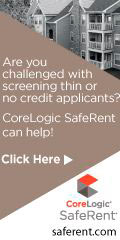
| Past Issues | Advertise | www.faahq.org | Multifamily FLORIDA archive | November 2010 |
Dealing with the Unit Fire
by Harry A. Heist, Attorney at Law Experiencing a unit fire is inevitable in a property manager’s career. Most often in the early morning hours and due to a cooking incident, a unit fire results in chaos, and decisions are often made hastily by the property manager who has little experience with such an event. Since a unit fire is fortunately not an everyday occurrence for the manager, preparation needs to be taken now for the time when a fire will occur. There are a myriad of issues that have to be dealt with under the worst of conditions. After the fire, the next day and days to follow will hold even further surprises and challenges that the manager has absolutely no experience in dealing with. What seems to be the best thing to do at the time, or using common sense, will most likely result in the wrong decision. This article will examine the preliminary problems that arise at the time of a fire and shortly thereafter. The Night of the Kitchen Fire Your parking lot is filled with fire trucks, all the residents are outside, and the fire department is using its usual massive amount of water to put out the kitchen fire, cut holes in the walls and break all the windows in the unit. Seems odd, but we will leave that alone. It just seems to be the way it is done. The fire is out, and now you are dealing with one or more units that are uninhabitable due to fire, smoke or water damage, and along with that are the displaced residents who have no idea what is going to happen next. But wait! You have two vacant furnished corporate units and a model unit. So what do you do? Nothing, right yet. Calling your water extraction professional while the fire is burning! Any reputable water extraction and drying company will have an emergency number and will be out to your property immediately, usually within the hour. This is their job. It is your job to have such a company set up far ahead of time, have their number on speed dial, and take the drying of the affected units as seriously as possible. You cannot let the most heavily destroyed unit overshadow the other units which may have experienced flood damage. The sooner these units are attended to with proper drying and water extraction, the less money you will have to spend later on mold remediation or major replacement of drywall, cabinets and carpeting. More importantly, if you end up experiencing mold growth, or it is discovered later that you have to replace more carpet and drywall, you increase the odds of having legal problems when residents try to withhold rent, claim damages to their personal property or complain of health issues. If your company has tried to take the dangerous shortcut and bought a bunch of blowers, understand that using these blowers could dramatically increase your liability and legal exposure. Blowing around mold spores is not the way you dry out carpets or walls. The Big Mistake Your water extraction/drying company is on their way, so that potential problem is addressed. Naturally, you are feeling extreme sympathy for the displaced residents and want to make them as comfortable as possible and as soon as possible. After all, it is all about customer service and resident retention, correct? So you get the keys to the corporate units and the model unit and tell the residents that they can temporarily use the units, units which by the way are nice, clean and filled with beautiful rental furniture. What’s the problem here? The problem comes a little later. Allowing the residents who caused the fire in their unit to occupy a corporate unit or model Although your residents caused the fire due to their own negligence, you have placed them in your corporate unit. The unit where the fire occurred turns out to be badly damaged; the rehab of the unit will be thousands of dollars, and the residents will NOT be able to move back in any time soon. Then, there becomes a dispute about how the fire started. WHAT? The residents say that the stove was defective. You know that they just had a grease fire that was their fault. However, the Fire Marshal cannot make a proper determination, since the stove has been so badly damaged by the fire, and the firefighters who pulled it from the wall pretty much tore everything up in the process. The residents’ family now are comfortable in the corporate unit with the rental furniture and wide screen TV’s, and even though you have other vacant units for them to move into, they have decided not to leave. It is now a full week after the fire. You call your attorney, and he tells you that the eviction may be extremely difficult if there is no lease agreement, or if it is unclear what type or arrangement has been created. Without a true landlord/tenant relationship, the Landlord/Tenant Act does not apply, and you cannot file an eviction. Possibly a wrongful detainer action will need to be filed if the residents refuse to vacate. Allowing other, innocent residents affected to occupy a corporate unit or model Often, other units have been affected by the fire, smoke and most commonly water that has cascaded down the walls. Again, you decide to help the affected residents out the night of the fire, and you put them in your nice model unit. After all, it will just be a couple days, right? Now comes the fun part. The affected unit below the unit that had the fire was flooded pretty badly, still smells like smoke, and within 3 days mold is already growing on the walls and furniture. The residents refuse to move back in until you replace their furniture, or if they do move to another unit in your community or elsewhere, they want moving expenses and money that they believe is owed, as much of their furniture needs to be replaced and is covered in mold. The fire was not their fault, and they feel that you should do something about it and make them whole. You just rolled into the next month, and the residents are refusing to give you a dime, all the while using your model unit and all the utilities. Again, you call your attorney and he gives you the same story: no lease, and possibly no tenancy under which an eviction is possible. Avoiding the problem When there is a fire or any other natural disaster for that matter, the Red Cross is well equipped to deal with the immediate needs of individuals. They are prepared and equipped to assist the person whose unit had the fire and others who were affected by the fire. The Red Cross will give the individuals vouchers for hotels, clothes and food. Hundreds of Red Cross volunteers throughout Florida respond to fires and disaster every single day, and they are the ones to whom you need to leave the task of housing the residents. While this may seem harsh or cruel when you have empty units, models or corporate units just sitting there, please trust us on this. We see this all the time, and we know what we are talking about. While you may deal with a fire once every 5 years, we deal with them every single week, due to the sheer number of property managers we represent. Just resist the temptation and don’t house the displaced residents. If for some reason the Red Cross is not there and the residents have absolutely nowhere to go, call a local hotel, pay for a specified number of nights, and make it clear that you will absolutely not pay for one more night. You do not want the resident for whom you are paying to fail to leave the hotel room and have your company stuck with the bill. If the hotel serves food, place reasonable limits on what can be spent. Florida law does NOT require you to house, clothe or feed a displaced resident. It only requires you to abate the rent for the period of time the resident cannot occupy the unit. You can’t control yourself and want to put the resident in the model or corporate unit We fully understand that some property managers just will insist on putting the residents in their available corporate units or models. It is human nature to want to help out those in their time of need. Is it completely fatal to take this risk? Will things always turn out badly? Actually, chances are that everything will turn out okay, but why take the gamble? The main thing if you do decide to place the residents in the corporate unit or model is to use a Temporary Housing Agreement in this situation. Keep it handy though, because remember, it is 3:00 a.m., and you are not in a condition to have to start up your computers and locate files. The purpose of this form is to create a real legal tenancy with the resident or residents, so that in the event things go bad and they refuse to vacate, you will be able to evict them. Without using the form, it can be very unclear as to what tenancy has actually been created, or it may be that no tenancy has been created. It is up to you how much time you will allow your displaced resident to stay in the unit, and this will depend upon the severity of the fire. At 3:00 a.m., you probably have no accurate information about the extent of the damage, so keep the time limit short; you can always extend later. When you examine this form by clicking here to download, you will see it is simply a miniature, pared down, bare bones lease. Will it create a tenancy? Yes, one that can be terminated by you and will allow for a fairly cut and dry eviction action if necessary. Of course we don’t want to have to file an eviction on someone who is occupying a corporate or model unit; therefore, we strongly recommend that even though we have helped you in this situation by providing this form, you will be far better off NOT housing your residents. The Red Cross will find them a place to stay temporarily, or you can take the hotel route we discussed. What’s next? Ideally in a perfect fantasyland of dragons, wizards, princes and princesses, your resident who caused the fire will admit it was his fault, write you a check for the damage to his unit and the surrounding units, everything will be fixed in a couple days, and everyone will live happily ever after. Keep dreaming, and next month we will examine the post-fire issues, damages and possible actions that must be taken against the resident who had the fire and the residents whose units cannot be quickly repaired. If you are to experience a fire before next month, make sure you call your attorney as soon as you can. Often we find out about our clients having fires by watching the news or reading the newspaper. It is only after they have made a number of mistakes that they call us. It does not have to be this way. There is a better way. |


